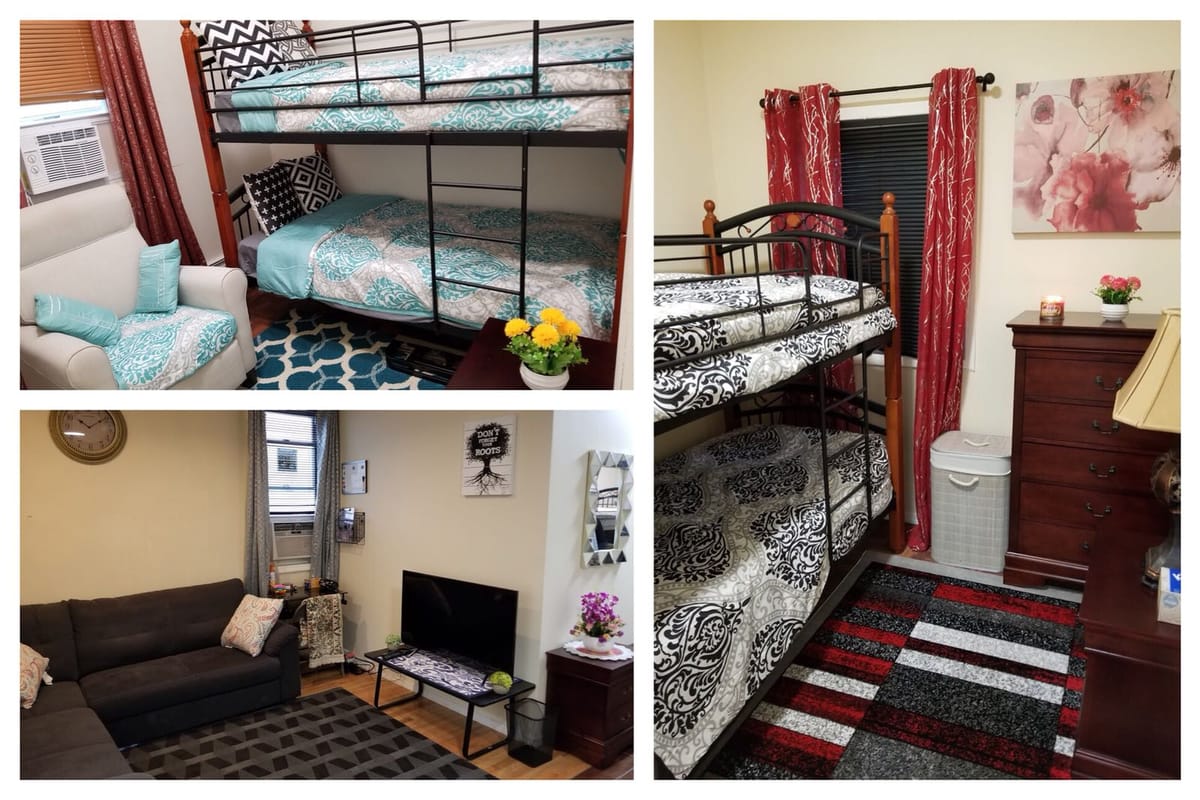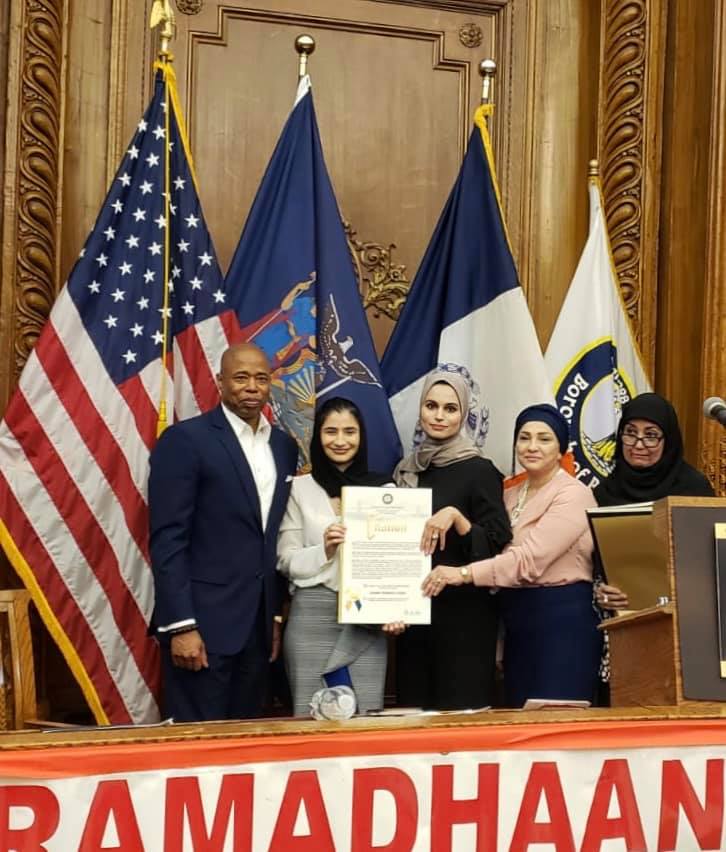Asiyah Women’s Center: A New Start For Domestic Violence Survivors


SUNSET PARK – After New York was put on PAUSE back in March to help fight the COVID-19 pandemic, everyone was expected to stay home as much as possible. There were few places to go, with businesses, schools and houses of worship shuttered. Those in need of help had to look online.
NYC HOPE, a website offering online resources to domestic violence survivors, saw a major spike of visitors to the group’s website with 1,240 visits—an average of 95 visits a day—between March 18th and 30th, Gothamist reported. But a lot of people in search of help weren’t reporting the violence. “The Police Department said that reports of domestic violence have ‘progressively declined’ since the onset of the pandemic. The crimes, which include beatings, break-ins, and killings primarily among couples and families, fell nearly 15 percent last month compared to March 2019,” the NY Times reported.
Dania Darwish, the co-founder and executive director of the Asiyah Women’s Center, said her phone has been ringing nonstop since March. Every day, several women are inquiring about placement in the center.
“I would say that COVID-19 increased our uptake of people looking for shelter by three times,” Darwish said. “Because of the pandemic, we’ve also had to take fewer people because of social distancing.”
Currently, there is a waiting list of 15 women looking for placement in the center. Once a spot opens up, they’ll get a call.
In the meantime though, the Asiyah Women’s Center is looking to expand.
“We named the Asiyah women’s center after Asiyah, who is Moses’ adopted mother. She was a domestic violence victim and abused by the pharaoh, who murdered her because she refused to proclaim that he is God,” Darwish said. “As she was dying she asked God to build her a house in paradise next to Him, and her prayer was answered. Now, we are building a house for domestic violence survivors.”
By September, they are hoping to put an offer on their first home. The new home will house 45 women and children, which is more than double the amount they can house currently. It will also include in-house social services, such as an on-site social worker at all times. Darwish acknowledged that the process is extremely strenuous, but the end will be worth it.

Before August of 2018, women would often come to the Muslim Community Center and stay there for the night. They shared similar stories – their husbands kicked them out, their husbands beat them up. For a while, Muslims Giving Back (MGB) paid for hotel rooms, but that soon became too expensive. What they were not going to do was tell a woman she couldn’t sleep at the masjid.
The turning point came one night when a Yemeni woman came to Mohamed Bahe, the co-founder of MGB, seeking help. At 11 p.m., he drove her to a public shelter in the Bronx. An hour later, she called back crying. She said she was being discriminated against because she was Muslim; she was being verbally attacked for wearing a hijab. She went back to her husband. That is when they realized something had to be done, and in August 2018, the Asiyah Women’s Center was born.
The center, which provides women with housing, support, and empowerment, is 100% funded by the community and is the first Muslim women’s emergency shelter in NYC. It operates under the umbrella of MGB.
“We had realized that there was really no place for women and children in the Muslim community to have somewhere to go where they can get the support they need to leave a really abusive situation,” said Darwish. “Seeing how many women in our community require that assistance, but there was nothing like this to exist, we decided to build this.”
Darwish is a 27-year-old woman with a full-time job who also runs the Asiyah Women’s Center full-time. Every day, there’s something new going on. On the day we spoke this week, she was making final adjustments for transitioning some women out of the center before the holiday weekend. She was also sending out tons of emails applying for grants, trying to get city funding. Some days, she’s out helping a woman move into her own apartment. Other days, she’s at the labor and delivery room in the hospital coaching a woman as she’s giving birth. Every day is a new challenge– but she loves it.
In less than two years, the Asiyah Women’s Center has served over 175 women and children.
When a woman is inquiring about shelter, Darwish and her team interview her and do a background check. They’ll see if she is a good candidate for the center. And then, they will take her in. On average, women stay about two and a half months at the center, but individual stays vary greatly. Someone stayed for one day. A pregnant woman who had been staying at the center gave birth, and ended up staying for five months, “Because we are not going to have them leave postpartum,” Darwish said.
The Asiyah Women’s Center is located at an undisclosed location to protect the women. The house consists of six bedrooms, 20 beds, two bathrooms, a living room, and a kitchen. Darwish recalled the times when she would bring the women over to the center, and they’d ask, confused, if they were stopping at Darwish’s home. She’d tell them no– this is the center.
“At the entrance, a sign in English reads, ‘Don’t forget your roots.’ Inside, news is usually broadcast in Arabic, and sometimes a Bengali musical will play on a 40-inch screen,” the NY Times described it in a story last year. “Scents of Middle Eastern food and South Asian curries waft through the open kitchen and living room.”
The energy inside the center is very positive and cozy. Currently, there are two kids inside the home, constantly running around. There is always someone cooking. The Asiyah Women’s Center is home to women from all different backgrounds. There are Arab women, South Asian women, African American women. And so someone is always cooking something they would make in their own home. One day they’ll eat spicy curry chicken. The next day they’ll eat hummus.
“People cook for each other. They take care of each other,” Darwish said. “The women in our center find support from each other. They don’t see each other as strangers; they see each other as people who are friends… helping uplift them to safety and to stability.”
The goal is to help transition women out of the shelter to a room or apartment of their own. Sometimes, the city won’t provide a woman with vouchers quickly enough or a woman just can’t afford it. This is why they are starting a new Asiyah Center Transitional Project, where they are renting out rooms to domestic violence survivors.

The majority of the women at the center are Muslim, though they’d occasionally get someone from a different faith. In the United States, the national average for domestic violence is 1 in every 4 women. There isn’t much data for domestic violence in the Muslim community, but a 2011 survey by Peaceful Families Project and Project Sakinah found that more than 66% of Muslims know a Muslim who has been physically abused, and over 53% reported experiencing some form of abuse themselves, Huffington Post reported last year. In the Muslim community, there is a stigma that comes with reporting or even talking about domestic violence. Asiyah Women’s Center works to change that.
“I think that stigma exists because sometimes people are embarrassed about what is going on in their own homes. People don’t want to talk about it because it’s deeply personal and they don’t want to acknowledge that it’s an issue. As a result, no one within the community is coming out and saying, ‘Hey, this has happened to me,'” Darwish said. “I think our center and the work we’ve done has helped change that narrative and has allowed survivors to come out and say ‘Hey, this has happened to me.’ It has allowed women to find safety within the community.”
“Our shelter provides that unique cultural and religious competency,” she continued, “that gives a woman the extra push that she needs to leave a situation and rebuild her life.”
When a woman first comes into the center, she’s usually very frazzled. Aside from the fact that she pushed herself to leave a hostile situation, she’s afraid because she doesn’t know what to expect. She has an idea of what a shelter is supposed to be and is expecting people to harass her. She is expecting the worst, Darwish explained. But through time, through love and support, through looking for jobs, through speaking with counselors, the woman will begin to feel empowered. And that is what the center aims to do.
To pitch in for their new home, check out the GoFundMe here. For other donations, or to seek shelter, you can reach out to them on Facebook and their Venmo at @asiyahwomen.



